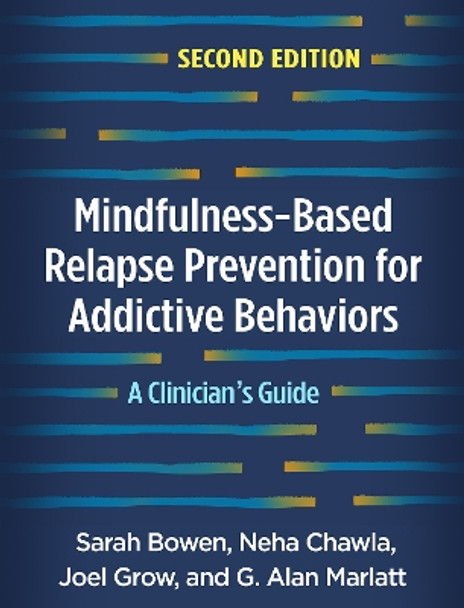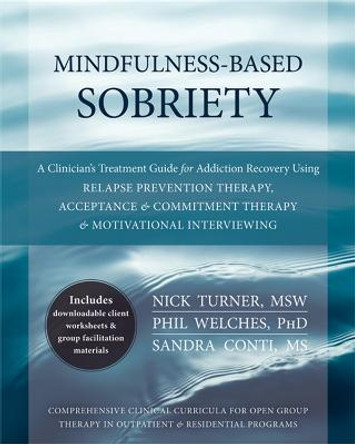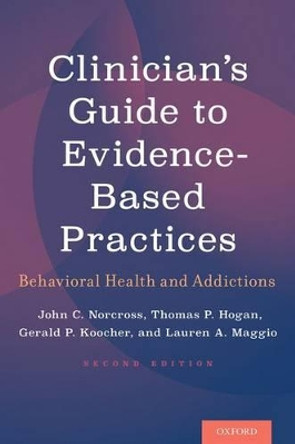Description
This authoritative book--now revised and expanded with important clinical and research advances--presents a proven approach for helping people meet the day-to-day challenges of recovery from addiction and maximize their well-being. Mindfulness-based relapse prevention (MBRP) integrates carefully tailored meditation practices with cognitive and behavioral skills building. In a convenient large-size format, the book includes instructions for setting up and running MBRP groups, session-by-session implementation guidelines, sample scripts, and 27 reproducible handouts and forms. Purchasers can download and print the reproducible materials at the companion website, which also features audio recordings of the guided practices. A separate website for clients provides the audio files only.
New to This Edition
*Reflects clinical refinements, the growing MBRP evidence base, and advances in knowledge about both addictive behaviors and mindfulness.
*Section on cutting-edge topics--culturally responsive adaptations, alternative group formats and settings, dual diagnosis groups, behavioral addictions, and uses of technology.
*Reproducible appendices: MBRP Fidelity Scale and quick-reference guide to the intentions of each session.
*Audio recordings now available online.
About the Author
Sarah Bowen, PhD, a clinical psychologist, is Associate Professor at Pacific University in Portland, Oregon. She is a longtime Research Fellow with the Mind and Life Institute and Trainer at the Center for Mindfulness at the University of California, San Diego. Dr. Bowen specializes in mindfulness-based approaches for treatment of addictive behaviors. Her research and more than 50 publications have focused on mechanisms of change and on treatment adaptations to best serve diverse populations and settings, with particular interests in dual diagnosis and underserved communities. Dr. Bowen facilitates and supervises mindfulness-based relapse prevention groups in numerous settings, including private and county treatment agencies, medical centers, and prisons. She presents, consults, and teaches internationally.
Neha Chawla, PhD, a clinical psychologist, is founder and director of the Seattle Mindfulness Center. In her private psychotherapy practice, Dr. Chawla provides empirically supported mindfulness- and acceptance-based treatments as well as mindfulness-based relapse prevention (MBRP) groups. A co-developer of MBRP, she serves on the clinical faculty of the Department of Psychology at the University of Washington. Dr. Chawla has written on a variety of topics related to mindfulness and has been involved in research on issues related to therapist training and competence. She has facilitated groups in both private and community settings and has conducted numerous therapist training workshops in the United States and internationally.
Joel Grow, PhD, is a clinical psychologist at the Seattle Mindfulness Center and serves on the clinical faculty of the Department of Psychology at the University of Washington. He provides evidence-supported treatment that incorporates self-compassion, mindfulness, and acceptance-based approaches. Dr. Grow was a member of the University of Washington research team that developed mindfulness-based relapse prevention (MBRP), and he remains active in MBRP delivery, training, and evaluation. He has provided behavioral health care and led workshops in a range of private and community settings. Dr. Grow co-developed and served as lead instructor for a 9-month certificate program at the University of Washington, where he received the UW Award for Teaching Excellence.
G. Alan Marlatt, PhD, until his death in 2011, was Director of the Addictive Behaviors Research Center and Professor of Psychology at the University of Washington. For over 30 years, Dr. Marlatt conducted pioneering work on understanding and preventing relapse in substance abuse treatment and was a leading proponent of the harm reduction approach to treating addictive behaviors. He was a recipient of honors including the Jellinek Memorial Award for outstanding contributions to knowledge in the field of alcohol studies, the Robert Wood Johnson Foundation's Innovators Combating Substance Abuse Award, the Research Society on Alcoholism's Distinguished Researcher Award, and the Career/Lifetime Achievement Award from the Association for Behavioral and Cognitive Therapies.
Reviews
"In the decade since this book was originally published, MBRP has gained considerably more empirical support. The expanded second edition represents an important update. It explains the rationale and theoretical underpinnings of MBRP and provides a session-by-session 'how-to' guide. This book is an extremely important tool for clinicians who choose to use MBRP in their practice and for students who want to learn more about this well-established, evidence-based practice."-Dennis M. Donovan, PhD, Department of Psychiatry and Behavioral Sciences (Emeritus), University of Washington School of Medicine
"MBRP was a frontrunner in the application of mindfulness and self-acceptance theory to the challenges that people face when they become caught up in addictive substances and behaviors. This updated second edition reflects the continued growth of the conceptual foundations of MBRP. It extends the work of the first edition in rich and meaningful ways, encompassing ongoing research, adaptation to different formats, and ever-broader clinical applications. As in the first edition, the attention to and sharing of detail is impressive, making this a truly state-of-the-art teaching volume for advanced students and training resource for professionals."-Jean L. Kristeller, PhD, founder, Mindfulness-Based Eating Awareness Training (MB-EAT); Department of Psychology (Emerita), Indiana State University
"This book continues to be the best available resource for establishing and maintaining an MBRP practice. All chapters are clearly written and easy to follow. In addition to detailing the content of each session, the authors effectively prepare the reader for the individual and group dynamics (including common challenges) likely to manifest in most, if not all, MBRP groups. The second edition reflects wisdom gained from an additional decade of author experience and practice, as well as the vast amount of research on MBRP and addictions published since the first edition."-Bruce S. Liese, PhD, ABPP, Professor of Family Medicine and Psychiatry, and Clinical Director, Cofrin Logan Center for Addiction Research and Treatment, University of Kansas-
Book Information
ISBN 9781462545322
Author Sarah Bowen
Format Hardback
Page Count 204
Imprint Guilford Press
Publisher Guilford Publications
Weight(grams) 726g








